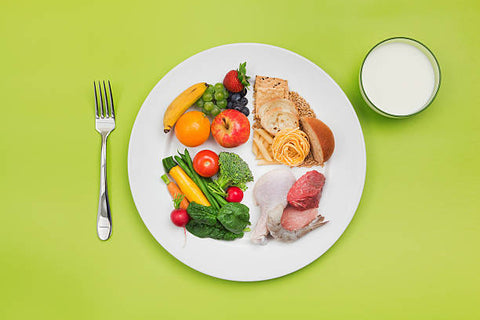In the quest to shed those extra pounds, we often turn to popular weight loss tips that promise quick results. But do these tips really work? In this blog post, we dive deep into the science behind some of the most commonly recommended weight loss strategies and separate fact from fiction.
Creating Distraction: Does it Work?
We've all heard the advice to create a distraction while eating - turn down the lights, play music, or even turn your house into a rave. But does this actually help with weight loss? According to Dr. Mike, there's limited evidence to support this claim. While it may divert your attention from food momentarily, it's unlikely to have a significant impact on your overall calorie intake.
The Myth of the Magical Mirror
Another popular tip is to hang a mirror in front of the dining table to reduce food consumption. The idea behind this is that seeing yourself eat will make you more conscious of your food choices. But the truth is, there is no scientific evidence to support this claim. Eating from a smaller plate, on the other hand, has been shown to help control portion sizes and reduce overeating.
The Truth About Intermittent Fasting

Intermittent fasting has gained popularity as a weight loss strategy. While it can be effective for reducing calorie intake, it's not suitable for everyone. Some people may develop disordered eating habits with fasting, and it's important to listen to your body's needs. Additionally, intermittent fasting has shown favorable health effects beyond weight loss, such as improved blood sugar control and reduced inflammation.
The Protein Puzzle

Getting enough protein is crucial for weight loss, but is it better to get it from whole foods or supplements? According to Dr. Mike, whole foods are the way to go. Protein-rich meals usually come with other nutrients like fat and carbohydrates, which are important for overall health. Nutrient-rich protein sources like tuna and salmon provide additional benefits like omega-3 fatty acids, which are good for heart health.
Chewing Thoroughly Matters

We often underestimate the role of mindful eating in weight loss. Taking the time to chew your food thoroughly not only aids digestion but also gives your body enough time to signal fullness, preventing overeating. So slow down, savor your meals, and be mindful of your eating habits.
The Hype Around HIIT
High-intensity interval training (HIIT) is touted as a highly effective weight loss strategy. It involves short bursts of intense exercise followed by periods of rest. While it does promote weight loss and muscle building, it may not be suitable for everyone. Additionally, improving heart rate variability, which is linked to improved survival in heart attack patients, can be achieved through other exercises as well.
Intuitive Eating: Lose Weight Without Hunger
Have you heard of intuitive eating? It's a philosophy that encourages listening to your body's hunger and fullness cues and eating in response to them. Contrary to popular beliefs, you can lose weight without feeling hungry all the time. By practicing intuitive eating, you can maintain a healthy relationship with food and avoid restrictive diets.
Debunking Snacking Myths
The belief that snacking frequently prevents metabolic slowdown has been debunked by modern science. The frequency of meals is an individual decision based on personal goals, lifestyle, and preferences. It's important to listen to your body and eat when you're hungry, rather than following rigid snack schedules.
The Benefits of Hydration
Drinking water has numerous benefits for weight loss. Not only does it help stretch out your stomach, reducing overeating, but it also aids in water-induced thermogenesis, which burns some extra calories. Staying hydrated improves exercise performance, calorie burn, and removes waste from your body, decreasing bloating.
The Power of Meal Prepping
Meal prepping is a popular strategy for weight loss. By planning your meals ahead of time, you gain better control over your food choices and cooking oils, which can help you eat healthier. It also saves you money and allows you to potentially learn a new skill. Ordering out, on the other hand, can lead to less than ideal food choices.
The Role of Diet and Exercise
When it comes to weight loss, diet plays a more significant role than exercise. While exercise is important for overall health, including weight loss, it's crucial to focus on your diet for sustainable results. Taking care of your sleep, exercise, and mental health is essential for your overall well-being.
Understanding Calories In and Out
The concept of calories in and out makes sense scientifically, but it's not always practical. Our bodies are complex, and weight loss is influenced by various factors beyond just calories consumed and burned. So while it's essential to be mindful of your calorie intake, it's equally important to listen to your body and prioritize overall health.
Conclusion:
Weight loss is a journey that comes with a lot of misinformation. It's important to fact-check popular tips and strategies to ensure you're making informed decisions. While some tips, like mindful eating and staying hydrated, have scientific backing, others may lack evidence. Ultimately, finding what works best for you and listening to your body's needs is key to achieving lasting weight loss.
Author: Nikita Vishnoi BCA













3 comments
I was diagnosed with Herpes four years ago. For over two years, I relied on prescribed medications and treatments, but unfortunately, my condition continued to worsen. The flare-ups became more frequent, the discomfort increased, and even simple daily tasks became difficult to manage.Last year, out of desperation and hope, I decided to try a herbal treatment program from NaturePath Herbal Clinic. Honestly, I was skeptical at first, but within a few months of starting the program, I felt some changes. My discomfort eased, my energy levels improved, and I felt I had more control over my daily life again.It’s been a meaningful experience for me, and I feel more like myself than I have in years. This is simply my personal story. You can visit their website at www.naturepathherbalclinic.com
info@naturepathherbalclinic.com
I was diagnosed with Herpes four years ago. For over two years, I relied on prescribed medications and treatments, but unfortunately, my condition continued to worsen. The flare-ups became more frequent, the discomfort increased, and even simple daily tasks became difficult to manage.Last year, out of desperation and hope, I decided to try a herbal treatment program from NaturePath Herbal Clinic. Honestly, I was skeptical at first, but within a few months of starting the program, I felt some changes. My discomfort eased, my energy levels improved, and I felt I had more control over my daily life again.It’s been a meaningful experience for me, and I feel more like myself than I have in years. This is simply my personal story. You can visit their website at www.naturepathherbalclinic.com
info@naturepathherbalclinic.com
Are you searching for a real spell caster ?
It is amazing how quickly Dr. Excellent brought my husband back to me.
My name is Heather Delaney. I married the love of my life Riley on 10/02/15 and we now have two beautiful girls Abby & Erin, who are conjoined twins, that were born 07/24/16. My husband left me and moved to be with another woman. I felt my life was over and my kids thought they would never see their father again. I tried to be strong just for the kids but I could not control the pains that tormented my heart, my heart was filled with sorrows and pains because I was really in love with my husband. I have tried many options but he did not come back, until i met a friend that directed me to Dr. Excellent a spell caster, who helped me to bring back my husband after 11hours. Me and my husband are living happily together again, This man is powerful, contact Dr. Excellent if you are passing through any difficulty in life or having troubles in your marriage or relationship, he is capable of making things right for you. Don’t miss out on the opportunity to work with the best spell caster.
Here his contact. Call/WhatsApp him at: +2348084273514 "
Or email him at: Excellentspellcaster@gmail.com ,
For more information visit his website:https://drexcellentspellcaster.godaddysites.com